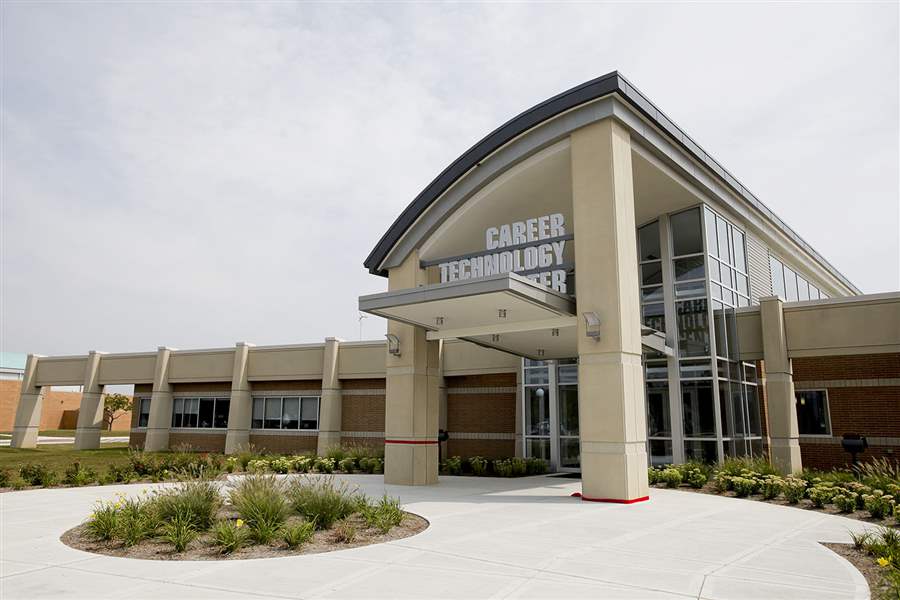
Monroe Community College considers tuition increase, cuts
President acknowledges being shocked by landslide defeat of levy
11/17/2014
The Career Technology Center is a relatively new facility for Monroe County Community College. The college may have to put additional growth on hold with the defeat of a levy.
THE BLADE
Buy This Image

The Career Technology Center is a relatively new facility for Monroe County Community College. The college may have to put additional growth on hold with the defeat of a levy.
MONROE — The defeat of Monroe County Community College’s levy request on Nov. 4 is expected to necessitate a tuition increase, greater fund-raising efforts, and further cost-cutting, the institution’s president said.

Quartey
“We will not be able to maintain our current level of programming without additional revenue,” MCCC President Kojo Quartey explained. “We are almost certainly going to have to increase tuition. We also will have to defer some maintenance, and at this point we’ll also ramp up our fund-raising among private donors.”
He said it was too early to talk about program eliminations.
The request for an additional 1 mill suffered a landslide defeat, with almost 61 percent of voters saying no. The new millage would have generated about $5 million annually for operations, updated technology and equipment, and facility upgrades. It would have cost the owner of a $100,000 home an additional $48 per year.
Longtime MCCC Trustee Mary Kay Thayer said levy revenue would have enabled the college to hold down tuition increases. “A lot of students drop out because they can’t afford tuition,” she said.
Tuition currently is $95 per contact hour for a county resident, $163 for out-of-county Michigan residents, and $193 for out-of-state residents. A typical full-time student would carry 12 contact hours per semester.
Mr. Quartey said he and levy supporters campaigned hard across the county for the millage, speaking to groups and distributing flyers door to door. He acknowledged being shocked by the margin of defeat.
“We know this was not a referendum on the college,” he said. “It’s just that individuals are not willing to pay any more taxes at the moment.”
The millage would have been in effect “in perpetuity,” according to the ballot language. This became an issue for Bedford Township opponents of the new tax; they called it a “forever tax,” and noted that South County property owners already paid MCCC’s 2.1794-mill tax. That millage was approved in 1980, the last time MCCC asked county taxpayers for additional money.
Mr. Quartey said pre-election polling did not indicate that the absence of an expiration date for the tax would be a problem, but he added that “with the benefit of hindsight, we probably would have done this differently.”
MCCC, like other community colleges in Michigan and Ohio, has experienced a decline in enrollment. Twenty-five of Michigan’s 28 community colleges are seeing declines this year, ranging from 0.2 percent to 12 percent, according to Joe Verkennes, MCCC’s director of marketing. The college’s credit enrollment in the fall of 2012 was 4,071. A year later, it was 3,777, and this year it is 3,482.
“Community and technical college enrollment tends to spike during economic recessions, which ours did, and then normalize when the economy gets better, which ours did as well,” Mr. Verkennes said.
“The reason for this is that community and technical colleges have a lot to offer adults looking to retrain and switch careers prior to and during economic downturns. We have normalized back to our prerecession figures of the early-to-mid 2000s.”
Contact Carl Ryan at: carlryan@theblade.com or 419-724-6095, or follow him on Twitter @CarlCarlryan17.